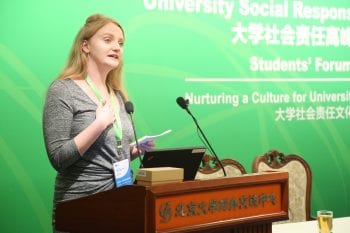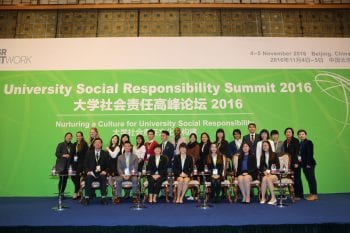Civic Scholar Laken Sylvander ‘17 joined research manager Matthew Bakko to represent Washington University in Beijing at the University Social Responsibility Network Summit and the Beijing Forum.
When I was informed I was selected to serve as the WashU student representative to travel to Beijing and present at the University Social Responsibility Network Summit, I was filled with excitement and suddenly aware of the immense personal responsibility this opportunity entailed. How could I convey the cultural specificity of social responsibility for an institution like WashU in a city like St. Louis to such an international audience? I struggle to explain what social responsibility in the context of St. Louis looks like to my own family of St. Louis natives, so translating this message on a global scale felt daunting.
I represented WashU in Beijing as part of the Gephardt Institute’s membership in the University Social Responsibility Network. The meeting coincided with the Beijing Forum and the World Youth Forum, and I took part in a panel of students discussing our views on the social responsibility of universities. As I crafted my presentation, it became clear to me that cultural competency is as crucial to social responsibility as the overall guiding intentions themselves. Initially, I intended to focus on student activism and protest as a means for students to bring community concerns to the leadership of the university. Ultimately, I expanded my approach to include all of the avenues by which students are able to communicate emergent social justice issues – ranging from the classroom to university policy.
At the Beijing Forum, I found that ideology, protest methods, and priorities vary enormously across cultural landscapes and geopolitical contexts. For instance, many of the universities located in areas that have suffered from natural disasters presented on the idea of training students as first responders in these kinds of emergencies. Other universities presented on the international service-learning work they do in the developing world in order to create stronger, more socially engaged leaders while opening that process up to critique. And, naturally, expanding the definition of social responsibility so broadly across global universities really brought the point home for me—home being St. Louis.
Social responsibility is not top-down, and the participants in the summit agreed that listening to the communities in which our institutions exist must be happening around the world—but that, naturally, each community will voice culturally and historically specific concerns and needs that must be recognized within those contexts. Hearing the specificities of these other university contexts really highlighted for me how radically grateful I am for the St. Louis community’s voice. In spite of its divisions, with a community as vibrant, as artistically and politically engaged, as hurting and committed as ours, I have found it so easy to ask what our community members want from us as an institution.
I have returned from Beijing overwhelmed with inspiration to engage fellow students in the work of bringing community voices to our policy makers. I am overwhelmed with gratitude to the students of universities around the world who are demanding that our institutions be community-oriented beyond service-learning, beyond programming, but in the very essence of what our universities stand for.

